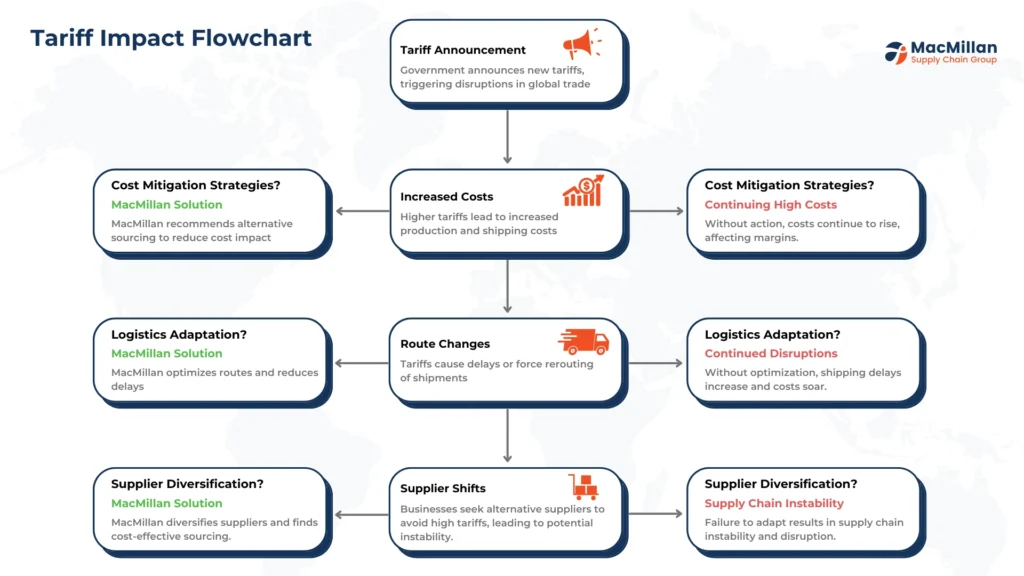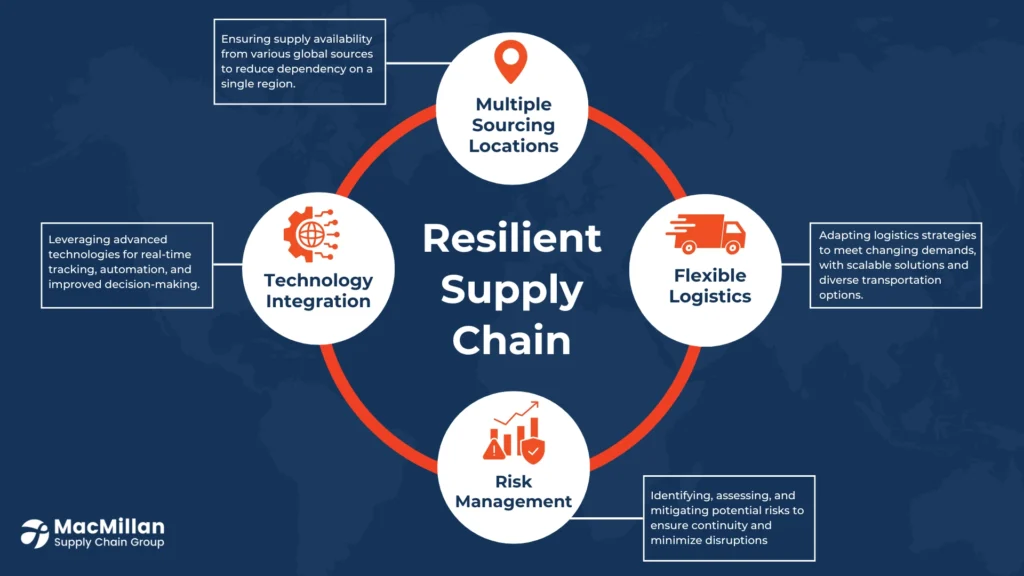A Quick Summary and Overview
The worldwide shipping industry is expected to change as a result of Donald Trump’s planned tariffs, which include a 60% tax on Chinese goods and a 10% tax on all U.S. imports. These regulations will probably result in temporary increases in shipping costs, change well known trade routes, and force companies to reconsider their supply chain plans. To effectively reduce costs and interruptions, businesses must prioritize supply chain diversification and implement flexible logistics solutions. The effects of these tariffs on the shipping sector are explored in this article, which also provides professional advice from MacMillan Supply Chain Group on how companies may effectively handle these difficulties.
An Introduction
The dynamics of global commerce and their effects on the shipping sector are receiving more attention as a result of Donald Trump’s possible return to the presidency. considerable hikes are proposed by his strong tariff measures, which will have a considerable impact on shipping rates and redraw established trade routes. These shifts force companies to reconsider their global supply chains in ways that go beyond simple statistics. Businesses must negotiate a terrain full of opportunities and difficulties, from changing sourcing tactics to getting ready for possible trade battles. Supply chain professionals who want to reduce risks and take advantage of new trends must comprehend these dynamics. This article explores the various ways that Trump’s tariffs have affected the shipping sector and offers insightful advice from MacMillan Supply Chain Group on how companies may adjust and prosper in this changing environment.
Trump's tariffs Increases and Frontloading
Trump’s proposal to impose a sweeping 10% tariff on all U.S. imports and a staggering 60% on Chinese products has immediate consequences for international logistics. Anticipating these measures, importers are likely to frontload shipments, accelerating imports to circumvent impending duties. This rush can temporarily boost shipping volumes but will concurrently strain logistics networks, leading to congestion at ports and potential delays in customs processes.
A brief spike in demand for shipping services is caused by the frontloading phenomenon, which may raise prices for all means of transportation. Significant price increases may be incurred by ocean freight in particular as businesses rush to shift goods prior to the imposition of tariffs. Port infrastructure may be overloaded by this unexpected surge in goods, leading to bottlenecks and longer lead times.
This offers businesses opportunities as well as obstacles. Savvy businesses may use this time to strengthen their relationships with logistics suppliers and negotiate advantageous shipping contracts, even though rising shipping costs and possible delays are worries. Businesses can build up a buffer against future volatility by securing capacity and rates ahead of time.
MacMillan Supply Chain Group advises clients to carefully analyze their import strategies, considering factors such as inventory carrying costs, storage capacity, and demand forecasts. By optimizing the balance between frontloading and just in time inventory management, companies can navigate this tumultuous period more effectively.

Impact on Shipping Costs and Trade Routes
The increased tariffs echo through shipping rates, creating upward pressure as logistics providers recalibrate their costs. This ripple effect extends beyond direct China U.S. routes, influencing global shipping dynamics. Consequently, importers may explore alternate supply chains or source from locales less burdened by Trump’s tariffs.
These changes affect global commerce routes in addition to cost structures. In order to perhaps lessen the effects of Trump’s tariffs, we might see an increase in transshipment activities, where commodities are routed through intermediary nations. This might increase the need for services in areas that were previously underutilized, changing the preferences of shipping lanes and port usage trends.
For example, when businesses diversify away from China, traffic to Southeast Asian nations may increase. Similarly, nearshoring trends may pick up speed, increasing transportation of commodities headed for the United States to places like Mexico and Central America.
Both importers and shipping businesses have opportunities and challenges as a result of these changes. Volumes on some routes might decline, but on others, they might rise at an unparalleled rate. It takes a sophisticated understanding of both new business opportunities and logistics understanding to navigate this complex environment.
MacMillan Supply Chain Group leverages its global network and market intelligence to help clients identify optimal routing strategies, balancing cost considerations with reliability and speed. By staying ahead of these shifting trade patterns, businesses can position themselves advantageously in the evolving global trade landscape.
Supply Chain Disruptions and Diversification
The anticipated Trump’s tariffs underscore the importance of diversifying supply chains. Relying heavily on any single region, particularly China, could expose businesses to undue risk, making strategic diversification paramount. By spreading sourcing across multiple countries, companies can buffer against localized disruptions and tariff-induced price hikes.
This approach not only shields against immediate impacts but also fosters resilience, allowing businesses to adapt swiftly to future regulatory or market changes. However, diversification is not without challenges. It requires careful evaluation of new suppliers, understanding different regulatory environments, and potentially navigating unfamiliar logistics landscapes.
Key considerations for effective supply chain diversification include:
- Identifying alternative sourcing locations with stable political environments and robust infrastructure
- Evaluating the entire cost of landing, taking into account possible customs, transportation, and compliance costs
- Assessing the scalability, quality standards, and capabilities of suppliers
- Taking into account the effects on lead times and inventory control techniques
By offering thorough market assessments, supplier vetting services, and efficient logistics solutions catered to various sourcing strategies, MacMillan Supply Chain Group helps clients navigate this challenging process. Businesses may execute successful diversification strategies that strike a balance between risk reduction and operational effectiveness thanks to our worldwide experience.
Supply chain professionals must diligently analyze global trends, prioritize flexibility, and continuously optimize logistics networks to stay competitive in this dynamic environment.
Infrastructure Investments
Although Trump’s administration recommends significant infrastructure spending, with a focus on improving ports, highways, and railroads, the real advantages are yet uncertain. By lowering transit times and expenses, improved logistics infrastructure might simplify supply chains and possibly offset certain tariff impacts. The scope and schedule of these projects are unclear, though.
Possible upgrades to the infrastructure could consist of:
- Modernization and port expansions to accommodate rising freight volumes
- Improved intermodal links to enable more seamless transfers between road, rail, and maritime transportation
- Improved rail systems to facilitate longer distance, more effective travel
- Better road infrastructure to ease traffic and speed up last mile deliveries
If successful, these investments might have a big impact on shipping dynamics and change how ports and modes of transportation compete with one another. Businesses may need to reconsider their chosen access points and distribution strategies within the U.S.
However, stakeholders should cautiously plan their operations, staying informed of policy developments and actively engaging in industry dialogues. The long term nature of infrastructure projects means that immediate relief from tariff pressures is unlikely.
MacMillan Supply Chain Group continuously monitors these developments, providing clients with timely insights and strategic recommendations. We help businesses position themselves to leverage potential advantages from these infrastructure upgrades as they materialize, ensuring our clients remain at the forefront of logistics efficiency.
Common Problems with the Topic and Our Solutions
Given the complex nature of Trump’s tariffs and global trade, businesses must contend with several challenges:
- Increased Shipping Costs and Operational Overhead: Many businesses’ margins are squeezed as a result of the tariff increase, which raises transportation costs. This is made worse by the possibility that frontloading tactics will raise the cost of carrying inventory.
- Disrupted Supplier Relationships and Trade Routes: When tariffs change, established routes may become unfeasible, necessitating new logistics and supplier agreements. Longer lead times, possible supply chain disruptions, and problems with quality control can result from this disruption.
- Compliance and Documentation Complexities: Paying close attention to documentation and customs procedures is essential while navigating the always shifting terrain of tariffs and trade rules. Penalties and expensive delays might arise from mistakes.
- Demand Volatility and Forecasting Difficulties: Uncertainty around tariff installations may cause unpredictable purchasing patterns, which makes demand forecasting more challenging and may even lead to stockout or overstock in some situations.
- Potential Retaliatory Tariffs: Historical precedence suggests the risk of trade wars, further complicating international trade environments and potentially closing off certain markets or making them economically unviable.

Solutions through MacMillan Supply Chain:
MacMillan Supply Chain Group stands ready to assist businesses navigating these turbulent times. Our comprehensive solutions include:
- Customized Logistics Solutions: We develop tailored strategies that consider your unique supply needs and mitigate costs. This includes optimizing transportation modes, routes, and carrier selections to balance speed, cost, and reliability.
- Global Sourcing Expertise: To reduce tariff effects and offer alternate supply pathways, our team supports a variety of sourcing solutions. We use our wide-ranging international network to find and screen potential suppliers, guaranteeing their dependability and quality.
- Proactive Policy Monitoring and Strategy Modifications: We continue to take a flexible stance when it comes to modifying our plans to reflect changing trade regulations. Our professionals regularly assess policy modifications, offering prompt analysis and suggestions to guarantee continued supply and a competitive edge.
- Advanced Analytics and forecasts Tools: By employing state-of-the-art technology, we assist clients in managing demand volatility through more precise forecasts, which improves inventory control and lowers the possibility of stockouts or overstocking.
- Compliance and Documentation Support: Our team of trade compliance experts ensures all documentation and procedures adhere to the latest regulations, minimizing the risk of delays and penalties.
- Risk Management and Contingency Planning: We develop robust risk mitigation strategies and contingency plans, preparing businesses for various scenarios, including potential retaliatory tariffs or further trade disruptions.
- Technology Integration: To enable real time tracking and decision making, we help integrate and optimize transportation management systems and supply chain visibility tools.
Businesses may access a variety of resources and experience by collaborating with MacMillan Supply Chain Group, which puts them in a position to not only survive the difficulties presented by shifting tariff environments but also prosper in the middle of all this complexity.
How Readers Can Avoid Problems or Implement Solutions
Businesses should take the following proactive steps to manage the effects of tariff changes:
- Perform a thorough audit of the supply chain: Examine your present supply chain to find weak points and places where possible Trump’s tariffs could have a significant impact.
- Diversify Your Supplier Base: To lessen your dependency on any one source, broaden your network to include providers from tariff-neutral areas.
- Implement Flexible Logistics Strategies: Adopt adaptive logistics systems that can quickly pivot in response to policy changes, including multi modal
transportation options. - Invest in Supply Chain Visibility Tools: Utilize technology to gain real-time insights into your supply chain, enabling faster decision-making and risk mitigation.
- Strengthen Supplier Relationships: Foster strong partnerships with suppliers across multiple regions to ensure continuity and potentially negotiate better terms.
- Stay Informed: Regularly monitor trade policy developments and engage with industry experts to anticipate changes.
- Optimize Inventory Management: Determine the ideal balance for your company by comparing the costs of carrying inventory against the risks of Trump’s tariffs.
To strengthen your supply chains against the unstable global logistics environment, join forces with MacMillan Supply Chain Group right now. Our team of dedicated professionals are available to offer customized solutions that take advantage of your strengths. We offer the expertise and international network to help you succeed, whether you require assistance with strategy planning, logistics optimization, or sourcing diversification. To arrange a meeting and discover how we can protect and enhance your logistics operations during these unpredictable times, get in touch with us right now.
FAQs
Trump's proposed tariffs are expected to cause an initial surge in shipping rates due to frontloading of imports. While this may present short-term gains for logistics providers, the long-term effects could be detrimental to global trade efficiency and profitability. MacMillan Supply Chain Group can help businesses navigate these fluctuations by leveraging our market insights and negotiating power to secure favorable rates and capacity.
Diversification is crucial. By sourcing from multiple regions and embracing innovative logistics technologies, companies can distribute risk and optimize costs amidst tariff changes. MacMillan Supply Chain Group offers comprehensive sourcing strategies and technology integration services to help businesses adapt effectively.
Tariffs could redefine established trade routes as importers seek more economically viable sourcing locations. Supply chains may realign to engage with markets not heavily impacted by tariffs. Our global network and market intelligence enable us to help clients identify and capitalize on emerging trade route opportunities.
While proposed infrastructure improvements could boost logistics efficiency, specific benefits remain to be realized once the projects commence. MacMillan Supply Chain Group continuously monitors these developments, providing clients with strategic insights to leverage potential advantages as they materialize.
Businesses are engaging in frontloading, stockpiling goods, diversifying suppliers, and restructuring supply chains to mitigate risks associated with proposed tariffs. We offer tailored strategies to help companies balance these approaches effectively, considering factors such as inventory costs, demand forecasts, and operational constraints.
Although tariffs could boost demand for oil and gas transportation, the overall impact is contingent upon broader trade regulations and market conditions. Our sector-specific expertise allows us to provide nuanced guidance for clients in the energy industry, helping them navigate these complex dynamics.
Retaliatory measures might intensify trade tensions, potentially disrupting global shipping and escalating costs across supply chains. MacMillan Supply Chain Group helps clients develop robust contingency plans and diversification strategies to mitigate the impact of potential trade wars.
In anticipation of tariffs, U.S. ports may experience unprecedented volumes, potentially leading to congestion and delays. We work closely with our clients to anticipate and address these bottlenecks, leveraging our relationships with port authorities and carriers to ensure smooth operations.
By partnering with MacMillan Supply Chain Group, businesses gain access to expert insights and tailored solutions to navigate these complex challenges effectively. Our comprehensive approach ensures that your supply chain remains resilient and competitive in the face of evolving trade dynamics.




